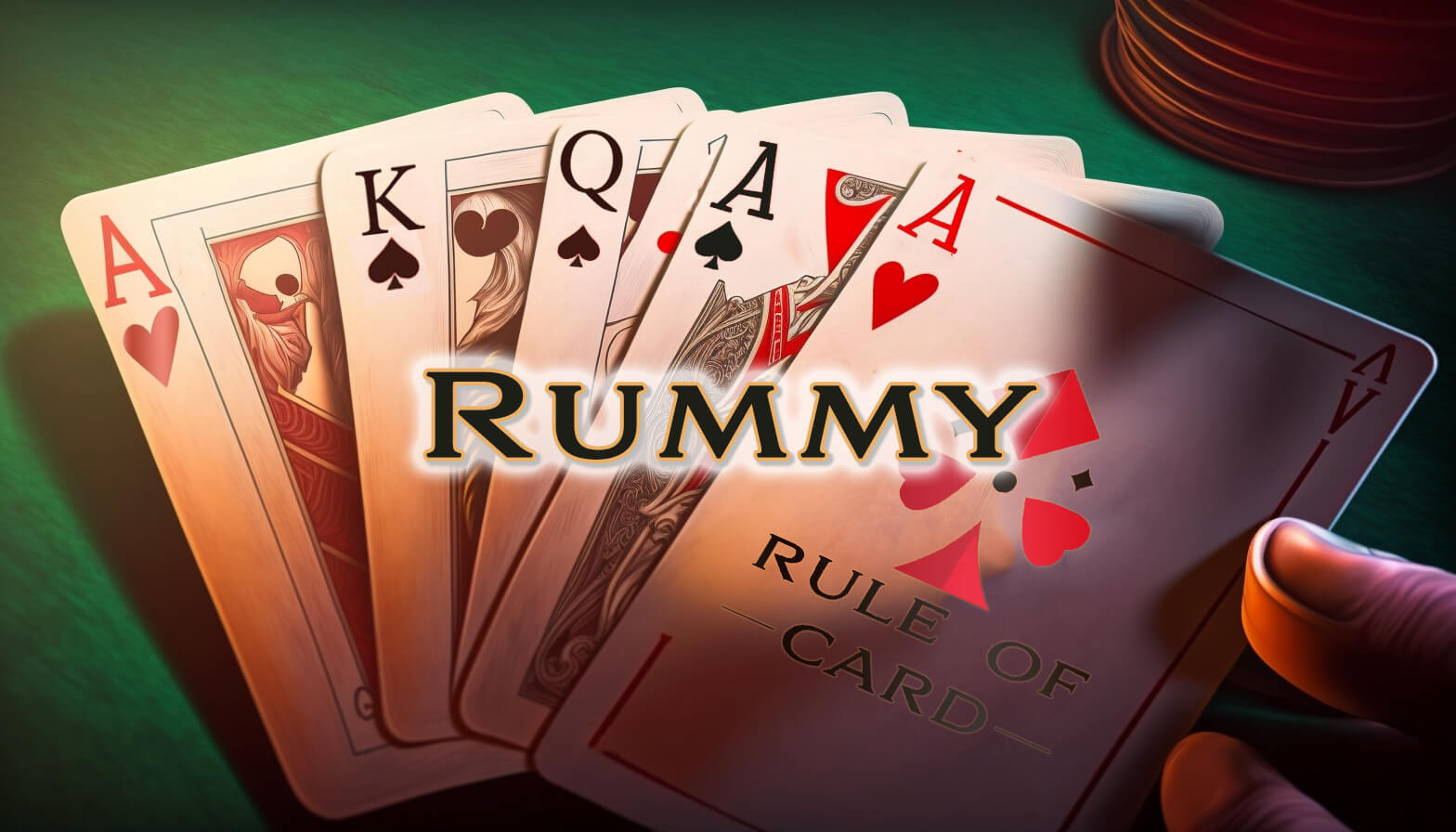Learn to Play Rummy: Rules & Tips
| Players | 2-6 Players |
| Difficulty | 4/10 |
| Recommended Age | 8+ |
| Game Category | Rummy |

Rummy Game Overview
If you're looking for a fun and challenging card game to play with friends or family, rummy is a great choice. This game is easy to learn and can be played with two to six players, making it a versatile option for any group. In rummy, the goal is to be the first to play all of your cards by creating sets and runs. Players take turns drawing and discarding cards until someone forms a winning hand. Rummy requires a combination of strategy and luck, making it an exciting game that anyone can enjoy.
To start playing rummy, you'll need a standard deck of 52 cards and at least one other person to play with. Each player receives a set number of cards, depending on the number of players. The remaining cards are placed face down on the table to form a draw pile, and the top card is turned face up to start a discard pile.
In rummy, each player takes turns drawing a card from a pile and then discarding a card from their hand. The goal is to create sets of three or four cards of the same rank, or runs of three or more cards of the same suit in consecutive order. The first player to play all of their cards wins the game. With these basic rules in mind, you can start playing rummy and enjoying this classic card game with friends and family.
Objective of the Game
The objective of rummy is to be the first player to get rid of all your cards. You do this by creating melds. The game ends when one player has no cards left, or when the draw pile runs out and nobody has won yet. The winner is the player with the fewest points in their remaining cards.
Getting rid of your cards is accomplished by forming sets and runs of cards. Players take turns drawing and discarding cards, trying to form these sets and runs.
Rummy Terminology
Let's clarify some of the common terms used throughout the game of Rummy
- Set: three or four cards of the same rank
- Run: three or more cards of the same suit in sequence
- Rank: the value of each card - Aces are 1, numbers keep their value, face cards are 10, and jokers are 20 (if used)
- Meld: groups of sets and runs that are played throughout the game
Materials Needed for Playing Rummy
- Standard deck of 52 playing cards
- Pen and paper for keeping score
Cards Used
To play rummy, you'll need a standard deck of 52 cards. The cards are ranked from low to high, with Ace being the lowest and King being the highest. Before the game begins, shuffle the deck and deal out the cards to each player. The number of cards dealt will depend on the number of players in the game.
| Number of Players | Number of Cards Dealt |
|---|---|
| 2 players | 10 cards each |
| 3-4 players | 7 cards each |
| 5-6 players | 6 cards each |
Other Supplies Needed
- None
How To Play Rummy
The game starts with the player to the left of the dealer. On your turn, you can either draw a card from the stockpile or the discard pile. If you draw from the discard pile, you must take all the cards in the pile, not just the top card.
After you draw a card, you can create melds or add cards to existing melds on the table. You can also lay off cards on existing melds that other players have created.
At the end of your turn, you must discard one card face up on the discard pile. The game continues clockwise around the table until one player has no cards left in their hand.
Now that you understand the basic rules of rummy, you're ready to start playing. Remember, the objective is to get rid of all your cards by creating melds and runs. Good luck!
Keeping Score
When playing rummy, understanding the scoring system is crucial. The objective of the game is to have the lowest score at the end of each round. Here is a breakdown of how to score in rummy.
Value of Cards
Each card has a specific point value.
- Aces are worth one point
- Number cards are worth their face value
- Face cards (jacks, queens, and kings) are worth ten points each
- Jokers are worth twenty points when included in the game
Winning Points
The player who goes out first wins the round and earns zero points. The other players receive points based on the cards remaining in their hand. The winner of the round receives the total of all the points from the cards remaining in the other players' hands.
Penalty Points
Inversely, you can think of the points as "penalties" against the players who don't win a round. If a player fails to meld their cards by the time someone goes out, they receive penalty points. The penalty points are based on the cards remaining in their hand with the same values listed above.
It's important to note that in some variations of rummy, there may be additional ways to score points. For example, in pool rummy, the winnings are calculated based on the entry fee and the number of players. In deals rummy, the winner receives chips equal to the points lost by losing players.
Understanding the scoring system is essential to winning at rummy. Keep these point values in mind as you play and remember to keep your score as low as possible.
Rummy Variations
There are several variations of the game, each with its own set of rules and objectives. Here are some of the most popular rummy variations and their differences. Many of these variations can be similar or the same that have been passed down under different names over time.
Points Rummy
Points Rummy, also known as Strikes Rummy, is a fast-paced version of the game that is played for a predetermined number of points. In this variation, each player contributes a fixed amount of money at the beginning of the game, and the winner of each hand takes the pot. The objective is to meld the cards into valid sets and sequences to earn points. The winner of the game is the first player to reach the predetermined number of points.
Additionally, some versions of Points Rummy impose a penalty on players who fail to meld their cards within a certain number of turns.
Deal Rummy
Deal Rummy, also known as "Deals" or "Best of Sets," is played for a fixed number of deals. In each deal, players are dealt a fixed number of cards, and the objective is to meld them into valid sets and sequences. In this variation, players contribute a fixed amount of money at the beginning of each deal, and the winner of each deal takes the pot. At the end of the predetermined number of deals, the player with the most money is declared the winner.
Pool Rummy
Pool Rummy, also known as Syndicate, is played for a fixed number of hands. In each hand, players are dealt a fixed number of cards, and the objective is to meld them into valid sets and sequences. In this variation, players contribute a fixed amount of money at the beginning of the game, and the winner of each hand takes the pot. At the end of the predetermined number of hands, the player with the most money is declared the winner.
In Pool Rummy, there are two variants: 101 Pool Rummy and 201 Pool Rummy. In 101 Pool Rummy, players who reach 101 points are eliminated from the game, and the last player standing is the winner. In 201 Pool Rummy, players who reach 201 points are eliminated, and the last player standing wins.
In summary, Points Rummy is played for a predetermined number of points, Deal Rummy is played for a fixed number of deals, and Pool Rummy is played for a fixed number of hands. Each variation has its own set of rules, and the winner of each game depends on the variation played.
Overall, there are many different variations of rummy to explore, each with its own unique rules and strategies. Whether you're playing for fun or for money, taking the time to learn these variations can help you become a more well-rounded and skilled player.
Tips and Strategies
If you want to win at rummy, you need to have a solid strategy in place. Here are some tips and tricks to help you improve your game.
Observation
One of the most important things you can do in rummy is to observe your opponents. Pay attention to the cards they pick up and the cards they discard. This will give you a good idea of what kind of hand they are trying to build. If you notice that they are discarding a lot of high cards, for example, it might be a sign that they are trying to build a low hand.
Discard Strategy
When it comes to discarding, you want to be strategic. Try to get rid of high-value cards that are not part of a meld. This will help you reduce your points if your opponent goes out. Be careful not to discard cards that your opponent might be looking for, though. For example, if you notice that your opponent is picking up a lot of spades, you might want to hold onto your spades until you can use them in a meld.
Melding Strategy
Building melds is the key to winning at rummy. Try to build melds as quickly as possible, especially pure sequences. This will give you a good foundation to build on. Don't be afraid to break up melds if you can use the cards to build a better meld. For example, if you have a run of 8-9-10, but you also have a 7 and a Jack, you might want to break up the run and use the 7 and Jack to build a meld.
In summary, to improve your rummy game you need to pay close attention to your opponents, be strategic with your discards, and focus on building strong melds. By following these tips and tricks, you can increase your chances of winning at rummy.





